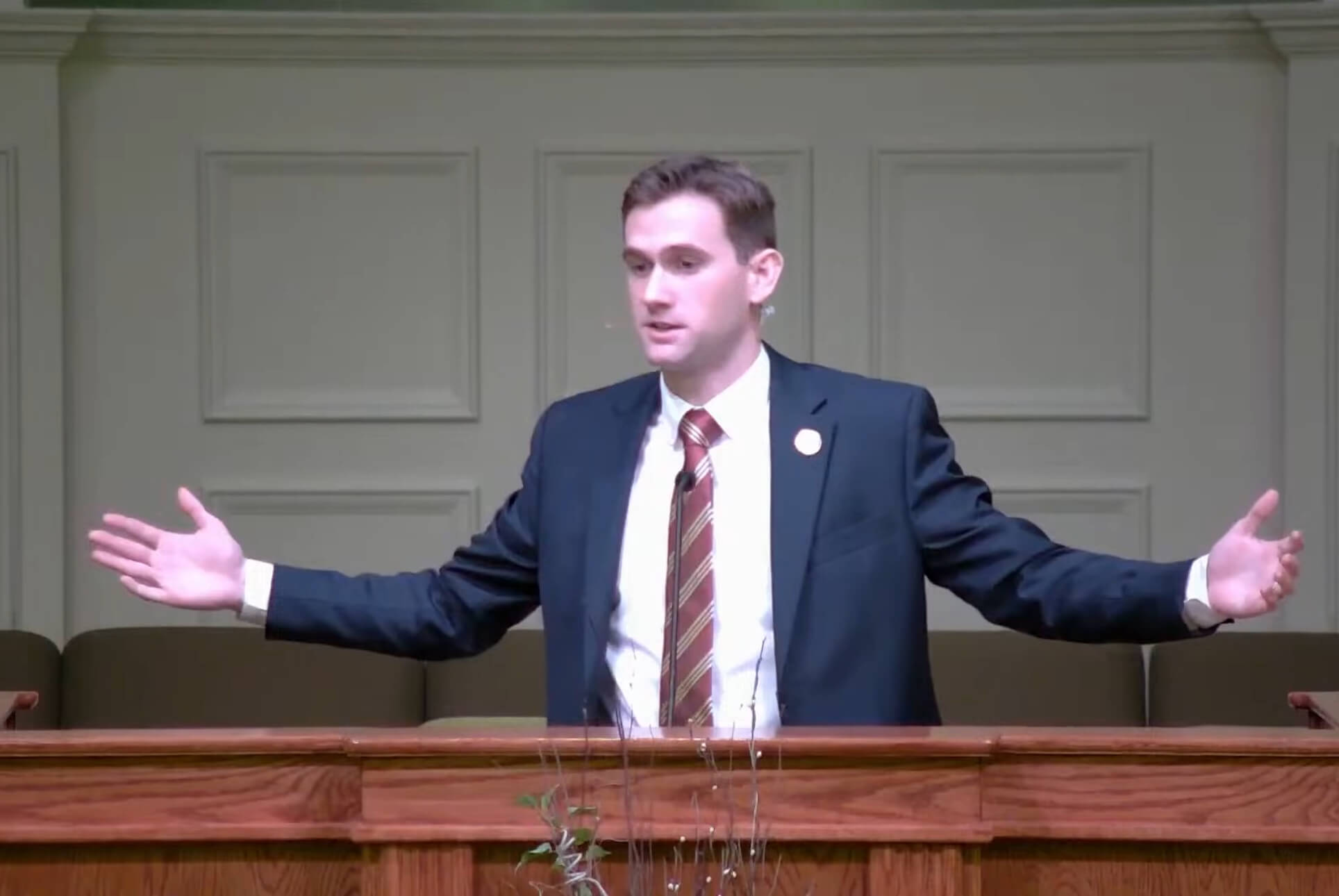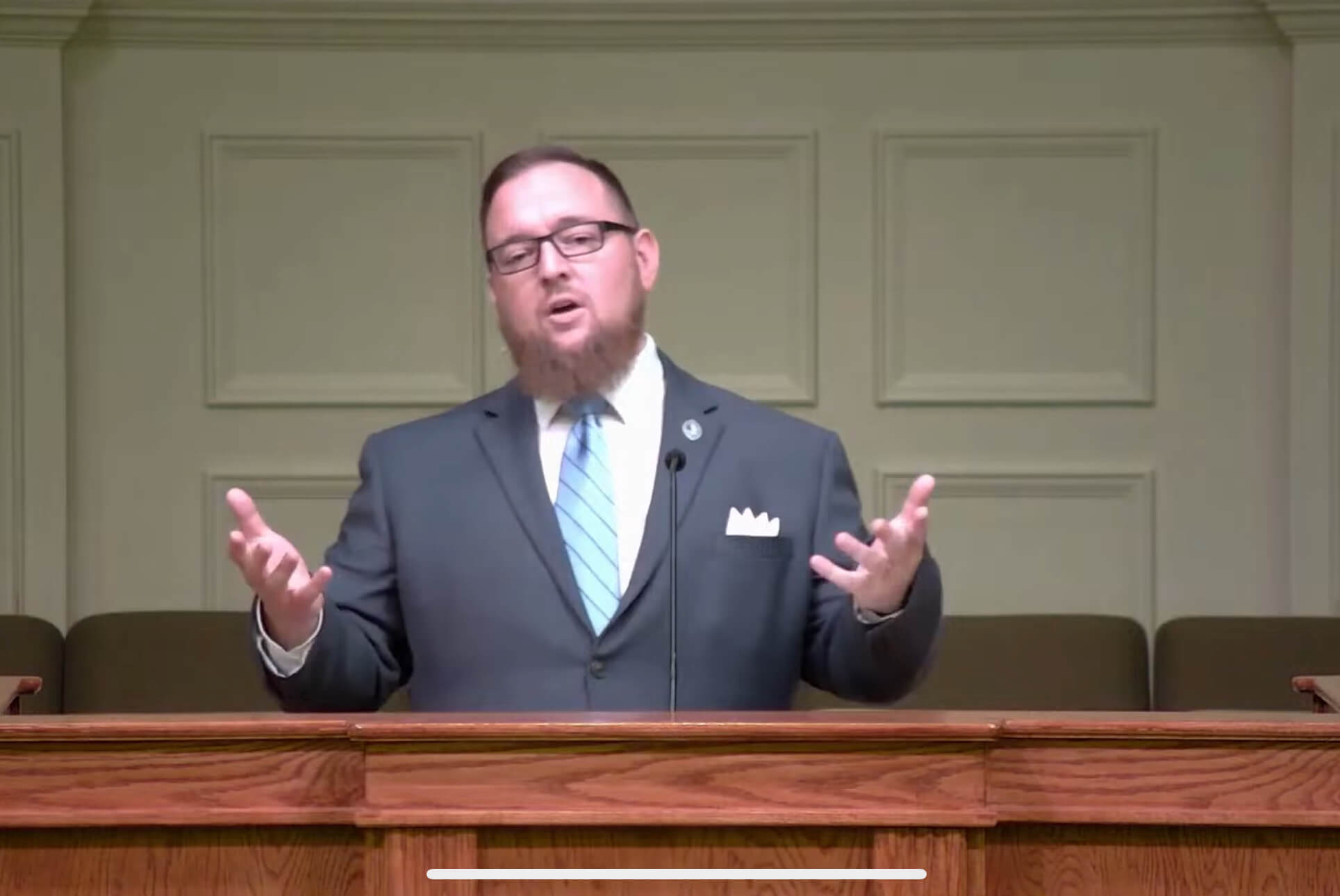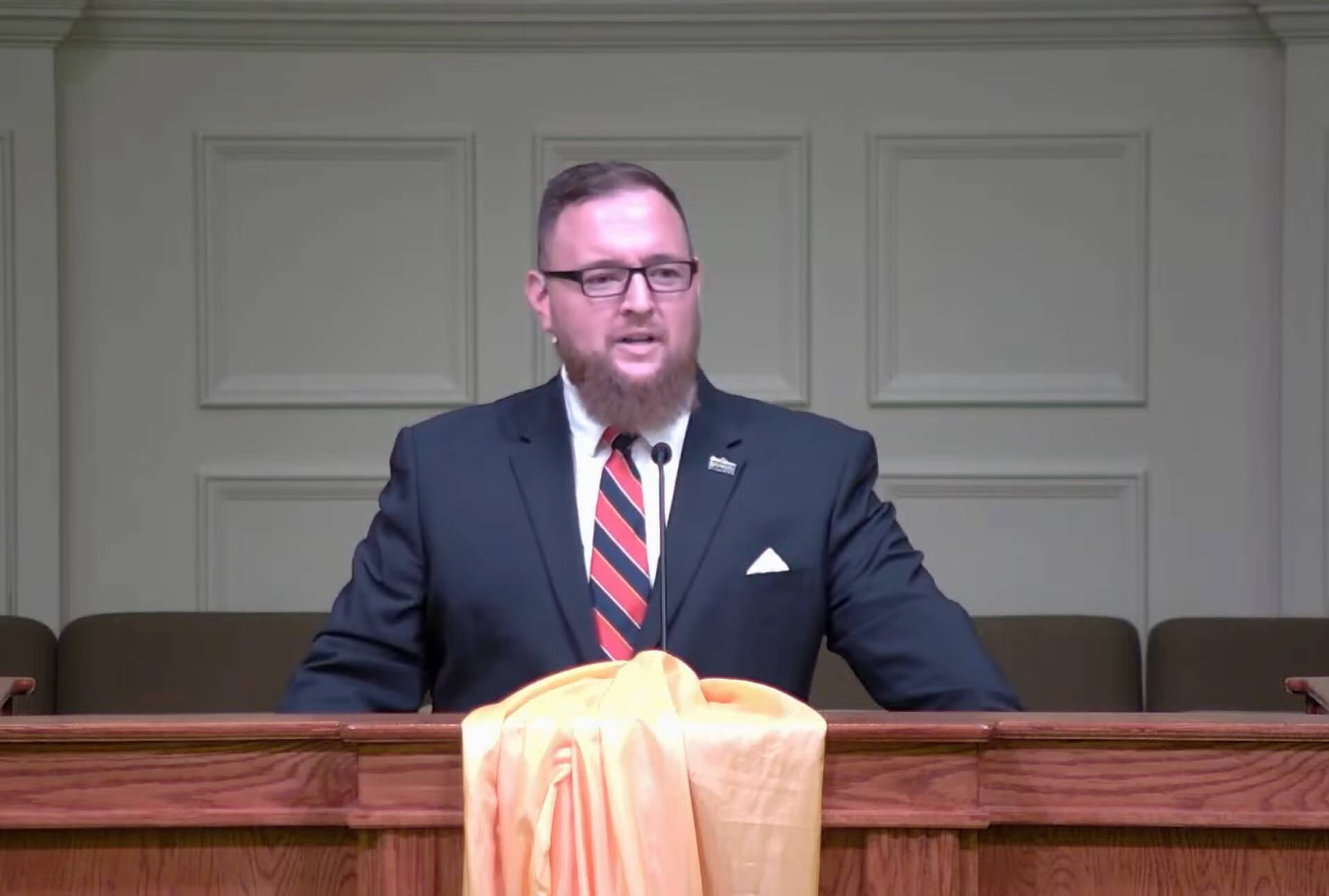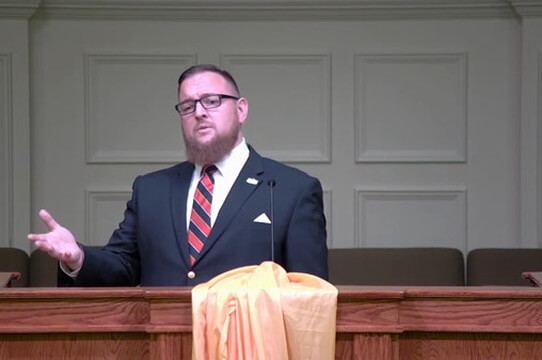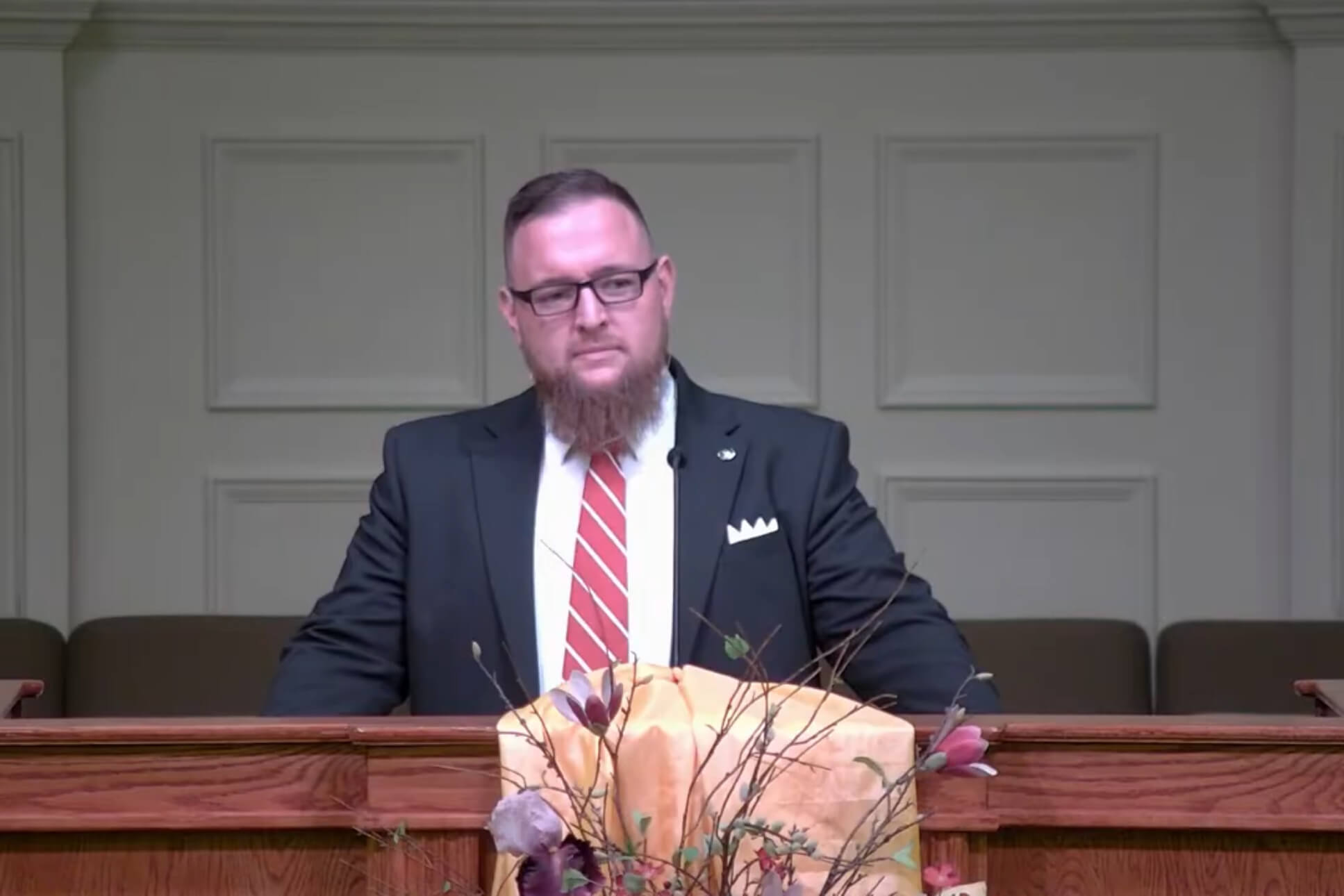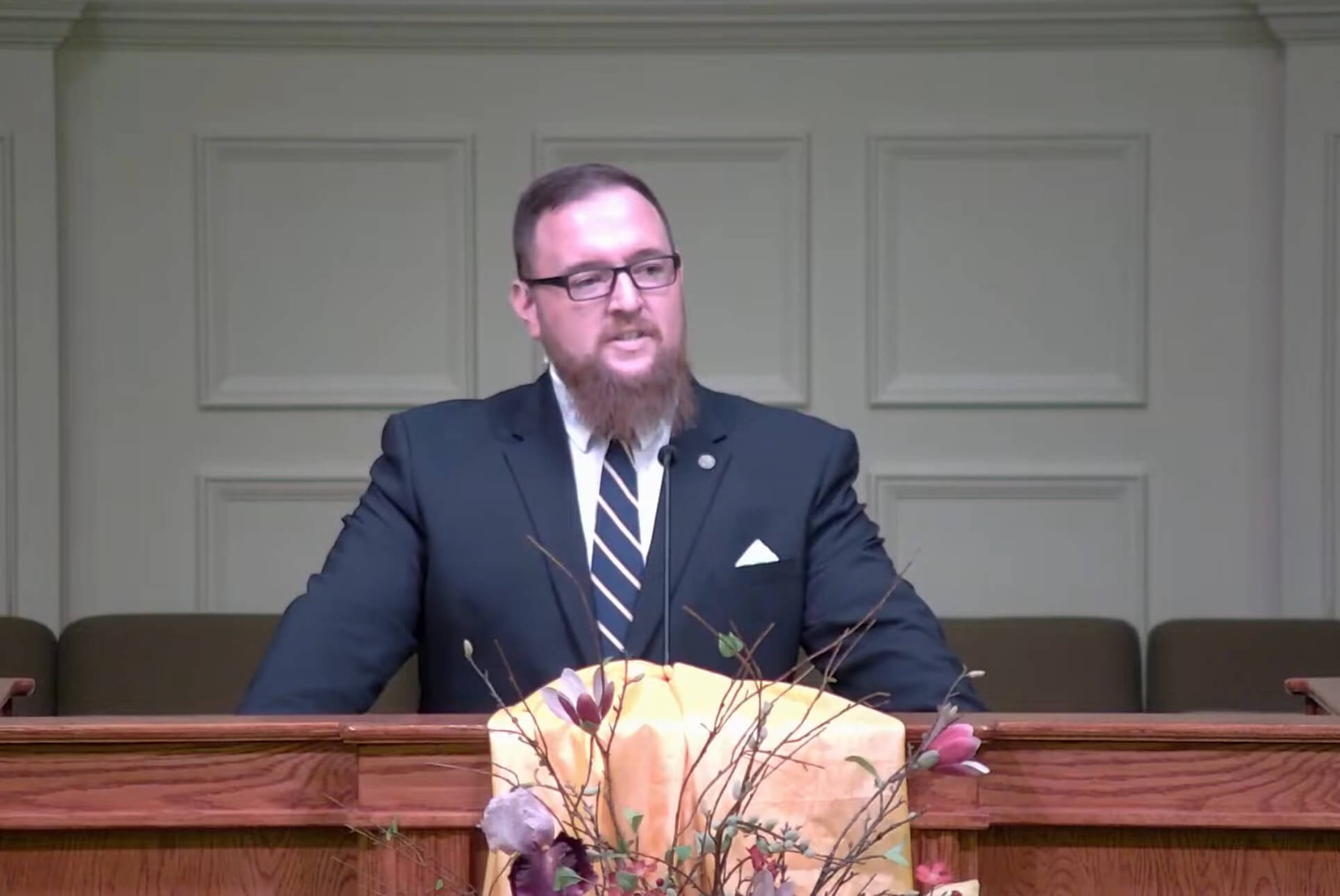Video
“Humble Trust”
Psalm 131
Stephen Kretzer
01/19/25
Audio
Transcript
Well, good evening. It is exciting to be back here again tonight to preach to you again from God’s Word. As Pastor Ryan said, we’ll be in Psalm 131 this evening. It’s a brief one, only three verses, but just as good. So Psalm 131, I’m going to go ahead and begin reading in verse one. Psalm 131, O Lord, my heart is not proud, nor my eyes haughty, nor do I involve myself in great matters or in things too difficult for me. Surely I have composed and quieted my soul. Like a weaned child rests against his mother, my soul is like a weaned child within me. O Israel, hope in the Lord from this time forth and forever.
Please join me as I go to learn prayer. Heavenly Father, I thank you again that we were able to gather here this evening. that you brought us all here safely. And I pray once again that your spirit will work in our hearts and in the lives of everyone here, and that the spirit works within me as I am preaching this evening, and that I am relying on the spirit, that the spirit will also work in the hearts of the people here, and that they will receive the truths of this message. In Jesus’ name, amen.
In 2014, I went overseas for the first time. Fellowship Baptist Church did a youth missions trip to South Africa and Madagascar. It was Pastor Dan, myself, and several others. First time overseas, it was a 16-hour plane ride over there to South Africa, and it was a great time. And South Africa’s interesting because they’re below the equator. So we went during summer, but it was their winter. Now, their winter, it’s not that cold, but it was cooler than it was here in June or July in Florida. So that was something to look forward to.
And our first day there, Pastor Dan and I, along with James Aleta, who was with us, got up and we thought, well, we have some free time and we’re going to go hike this mountain. We stayed on a mountain retreat. It was called Parterburg Mountain. It was beautiful. And we thought, we’re going to go hike this mountain. And James and I, being the Flutterians that we are, we’re like, oh my goodness, it’s so cold. We’re going to be freezing on this mountain. We need to layer up. And Pastor Dan just looked at us and was like, you know, guys, I don’t know. You’re going to be hiking. The sun’s going to come out. It’s probably going to get warmer. You might get sweaty and all that stuff. And, you know, being the 16-year-olds that we were, we thought, you know what? You don’t know what you’re talking about.
Granted, you grew up in upstate New York, and we’ve only lived in Florida all our lives, but we’re going to trust ourselves in this one. We know what we’re doing. So I think James and I both threw on, like, two pairs of pants, numerous hoodies, jackets, and we start hiking, and by the time we get to the top, We each had one pair of pants on and one short-sleeved t-shirt. We quickly learned that, oh wow, Pastor Dan was right and we should have trusted him because we got super hot. And it’s one of those things you look back on and you think we were a little arrogant. And because of that arrogance, we weren’t able to trust what Pastor Dan said, trust the wisdom and guidance he had. And when we come to Psalm 131, it’s teaching us that trusting God requires humility of our spirit. And as we see, even before we get into verse 1, it says it’s a song of ascent. which scholars tend to think this was sung by pilgrims, by Jewish pilgrims on their way to Jerusalem for the festivals.
So they would sing these songs with their families on their way to Jerusalem so they could focus their minds on God. So as they’re heading to Jerusalem for the different festivals, they would be singing these to focus on God. I think that’s a good reminder for us as well. When we read these psalms, they should help us focus on God. But it also reminds us just the importance of worship, and specifically even congregational singing. Our focus during that time, as we’re singing by faith, as we’re singing these songs, should be on God. And this psalm helps us remember that also. So in this psalm, we see that David is talking about trusting God requires humility of our spirit. I have three points, and my first point covers verse one. And it’s David’s recognition of who he is before God. I’ll read verse one real quick. It says, oh Lord, my heart is not proud, nor my eyes haughty, nor do I involve myself in great matters or in things too difficult for me. And from the very get go in verse one, the very first part of verse one, we see David speaking from a very humbled state. David was a shepherd who became a warrior and he was a king and he has humbled himself and he also has experienced many times in his life where he has been humbled.
So he knows what it’s like to be humbled. He knows the importance of it. We see, like I said from the very beginning, he is not full of pride here. He is not like James Auletta and I were in South Africa. We’re like, you know what? We don’t need to listen to you. We know what we’re doing. He’s working from a humbled state. We see the opposite of a prideful man. The NSV translates it, oh Lord, my heart. And heart is used throughout the Old Testament to refer to the innermost being of a person. Sometimes we can think of this as who you are, the innermost being, the center of all emotions and passions. So what David is saying is that he’s just not humble in one aspect of his life, but his entire existence on earth is one of a humbled state, a humbled state before God. His emotions, his passions, who he is, is a posture of humility.
I like to picture David with his eyes down, or not haughty, or not, when he says not haughty is another way of saying he’s not proud. So you picture him with his eyes almost, with his head bowed down and his eyes closed, which is a picture of humility. This reminds me of how in days of old, in the Middle Ages, even when you had kings and queens, when a subject of the king would present themselves to the king or queen, they would bow. Even today, even in England, if someone presents themselves to the king, King Charles III, they’ll bow. They bow because they are recognizing their state before the king, their humbled state before the king. You are the sovereign and I am not. I am your subject. And I think that gives us a picture here of David. David’s recognizing, I am God’s, I belong to God. I’m not in control of God, God is in control of me.
And it shows, this verse shows, verse one shows that he is not devoted to himself, but he’s devoted to God. And I think that’s really important to recognize, this humbled state that he’s in, the innermost being, his heart, his posture towards God, This humbled state is one where he’s devoted to God. And that’s how you are devoted to God, is from a humbled state. He has emptied himself of everything and given it to God. David recognizes that he must give his pride to the Lord. He recognizes his sinful state and that he needs God. I think as Christians, it’s always important for us to remember that we need God. This morning I talked about how Christ is our Lord and Savior. People sometimes would like to think that Christ is our Savior, but they don’t like to recognize the Lord part. They don’t like to think they need Him. But David is saying, I need God and we need to recognize we need God each and every day. He recognizes things are out of his control.
The second part of verse one, it says, Nor do I involve myself in great matters or in things too difficult for me. And more specifically, David is recognizing that he’s not to concern himself with the acts of the Lord. Like I said, he’s not God, he’s recognizing I’m not God, I’m not all controlling, I’m not all sovereign like God. And in all honesty, this posture of humility that he has, this devotion to the Lord that he has, this recognition that he cannot concern himself with the acts of the Lord, the miraculous acts of the Lord that he does, is probably and should be a sense of relief to him. Because he recognizes he is not all controlling. He does not have to control everything. His kingdom, the kingdom of Israel, is ultimately in God’s hands. And we see all throughout the Old Testament God working to preserve his people, and all throughout scripture, honestly, to preserve his children.
I recently had an interesting start to the week. We’ve had a lot of snow in Louisville, about 10 to 12 inches, which is not normal for Louisville. It’s also not normal for a Floridian, but you just got to work with what God gives you sometimes. So I had some car issues. the front part of my car, there was a cosmetic piece that broke off. And I was going to take it to the dealership, but I decided to hop on the interstate, and I was driving, and I felt and heard this noise, which is like the one thing you never want to hear on the interstate. Something’s wrong with your car. So I pulled over, and the cosmetic piece had sort of broken off and wedged itself between my car and the road. So I pulled off on the side of the interstate. It’s like 35 degrees out. And I’m trying to figure out what to do. And eventually I just came to the realization like, okay, I have roadside assistance, I can call a tow and they can take me to a car shop. But I had to wait for about an hour for the tow truck.
And I was just sitting there thinking, and I got to thinking of Psalm 131. I was like, you know what, this is not in my hands. And it’s not the worst thing ever that’s ever happened to me. But I was like, God is in control of this little thing too. And it was such a relief to me. It was such a relief, like, I don’t have to control every aspect of my life. I think David feels that too. I mean, he’s king, so he had a lot of pressure, he had a lot of responsibility, but he also realizes that at the end of the day, God is all controlling. In my translation, it says, in the last part of verse one, or in things too difficult for me, some translations use the word wonder, some use difficult, some use the word marvelous, and this Hebrew word is frequently used to refer to the mighty works of God. So his miraculous works, his mighty works, something like salvation.
One Old Testament commentator, Daniel Estes, says, David’s recognizing that the Lord alone does wonders like this. And David accepts his limits humbly before the Lord. So he’s recognizing this is what God does. These are acts of God. When the Red Sea was parted, when the world was flooded, these are acts of God, not of man. And he’s recognizing his state, his humbled state, before the creator, before the sustainer. David is not to think he could or can do what God does. And this reminds us that God is a jealous God. We are not to think that we can do what God does. God does not want David to be honored for the things that he has done. The many victories and battles that David won were ultimately due to God. God should and should always get the glory. It’s not about David, it’s about God. And God is worthy of the glory and the praise that he demands. So God demands of David, he demands of his children praise and honor, and he deserves it. He’s allowed to demand it, and he is worthy of it.
Exodus chapter 20, verse five. You shall not worship them or serve them, for I, the Lord your God, am a jealous God, visiting the iniquity of the fathers on the children, on the third and the fourth generations of those who hate me. And he’s talking about not worshiping other idols here. So God himself refers to himself as a jealous God. He wants the praise that he deserves. The acts that he has done should be credited to him. And it’s important for us to recognize that there’s a difference between the jealousy of God and the jealousy that we fight in battle. Because when we, it’s common for us when we see the word jealousy to automatically think of the way how we are jealous. But there’s a difference. Our jealousy comes from sin. It comes from not being satisfied with what we have and what we’ve been given. It comes from an unholy, pride-ridden desire to have what we do not. That the root of jealousy is pride.
It’s not a state of humility. But with God, God’s jealousy is a holy desire. Ours is an unholy desire, but God’s jealousy is a holy desire. A holy desire for His creation to worship Him. All creation is His creation, and He deserves the glory for it. He wants His creation to worship Him. He wants every single man and woman born to worship Him. God demands our praise and deserves it. And I think that’s sometimes hard for us to understand. As humans, we don’t like it when things are demanded of us. We don’t like it when people sometimes give us ultimatums. But God can do that. God should do that. And it is good He is jealous. It’s good he is jealous because if he wasn’t, we would be left to our own desires. If God did not care for us to worship or desire him, then he would leave us to our own desires. He would let us follow our pride-ridden lives. We would not need to bring glory to him. And there would be no need for salvation.
So when we think of the jealousy of God, it’s something we should be very, very thankful for. Because the God of the universe chose to demand of us praise. chose to make us and create us for his glory. And we should be thankful for that. As a king, David is a protector, but even he recognizes there is one greater than him, and he is not seeking to exalt himself. And as Christians, we must also recognize who we are before God, similar to what David is doing in this psalm. And this requires humility. Humility of our spirit. Humans must recognize who they are apart from Christ and their pride-fueled lives. It’s been said that pride is the root of all sin, and it ultimately comes down to you doing what you want and what you think is best for your life. That’s what a pride-fueled life looks like.
There was a Pepsi commercial that came out five or six years ago. At the end of the commercial, the girl was talking about, you know, it was a Pepsi commercial, and she was saying you should drink it. But she ended with saying, whatever you want, you do you. And that little phrase almost captures the postmodern world we live in. You do you. Morality is subjective to whatever you want to do. So a pride-ridden, pride-fueled life apart from Christ, is you doing whatever you want to do, following your own desires and chasing them, no matter the cost. Humans must recognize we are not in control of our lives and cannot save ourselves. We are truly sinful like David. David was a man after God’s own heart. He was a godly man. I mean, this psalm right here is a beautiful psalm, but we also read in the Bible that he was a man who sinned greatly at times. One way to describe our sinfulness is that of total depravity.
John Shelburne in his Sunday school class this morning actually went over this. But as a result of Adam’s sin, all enter the world as sinners incapable of saving themselves. Romans 3:23 says, for all have sinned and fall short of the glory of God. Not some, not this guy, not that guy, not these people. All have sinned and fall short of the glory of God. And we are not as bad as we could be, thankfully, but we are still bad. We are not good. Human beings are not good. And the world pushes that narrative, the narrative of ultimately you’re a good person, down beneath everything, down beneath all your bad decisions, there’s a good person there. But all you have to do is turn on the news and see that’s not true.
Over the past almost year and a half, maybe going on two years, we’ve seen the crisis going on in Israel. We’ve seen the atrocities committed by groups such as Hamas. We look at things like sex trafficking and murder, and even stealing. And they show us that the world, that people are not good. But I think it’s important for us to realize that it’s not just this really, quote-unquote, bad stuff, though. It’s that one little inappropriate look. that one little inappropriate or hateful thought, and that one little lie. And I use the word little intentionally because they are not in fact little, they’re still fences against the holy God, just like the sex trafficking, just like the murder, just like the stealing.
So even if you are not a quote unquote really bad sinner, you still sin. And you’re pride-filled states. And if you are apart from Christ, you are destined for eternity in hell. And if you are apart from Christ, you must confess your sins, repent, repent meaning a 180, completely changing your life and turning to Christ. And this means giving up our pride. That’s one of the hardest things for people to do when it comes to salvation is giving up who they are, giving up their pride-filled state. They don’t want to give up their control of their life. That’s the beauty of salvation and the beauty of what God has given to us. is He’s given us this gift of grace. And He says to us, you don’t have to be in control. I am in control.
And it is such a beautiful gift and such a relief. And yet it is so hard for us to recognize that. Now once we are saved, we must continue to practice a life of humility. You don’t get saved and suddenly become perfectly humble. You must continue to strive to live a humble life. And you must continue to strive to live a humble life like Paul talks about in Philippians chapter two, verses three through eight. I actually want to invite everybody to turn there, because I want to read Philippians chapter two, verses three through eight. In this passage, Paul is telling the church there, essentially in some ways, how to view and how to treat each other. And he uses Christ as an example.
So Philippians chapter two, verses three through eight, starting in verse three, Paul writes, Do nothing from selfishness or empty conceit, but with humility of mind, regard one another as more important than yourselves. Do not merely look out for your own personal interests, but also for the interests of others. Have this attitude in yourselves, which was also in Christ Jesus, who, although he existed in the form of God, did not regard equality with God a thing to be grasped, but emptied himself, taking the form of a bondservant and being made in the likeness of men. Being found in appearance as a man, he humbled himself by becoming obedient to the point of death, even death on a cross. Imitate the humility of Christ. Do nothing from selfishness or empty conceit.
So the Christian life is one where you’re esteeming one another higher than yourself. And Christ is the ultimate standard of humility. If you’re a Christian, you’re following Christ. He is the standard. Christians must constantly battle pride in their day-to-day lives. And by recognizing who we are, by admitting we are proud and cannot save ourselves, this leads us to being dependent upon God. And David realized this as well. Which brings me to the second point, covering verse two. David’s recognition that he must be dependent upon God. I’ll read verse 2 quickly. David in this verse is trusting the Lord and he’s leaning on him. He’s just finished talking about how he will not seek exaltation and those things that are of the Lord, and instead, he will find peace and rest in the Lord.
First part of verse two gives us the picture of a peaceful and calm scene, true peace. I love reading that. Surely I have composed and quieted my soul. A truly serene and peaceful scene. It reminds me, years ago I was on this little island in the Caribbean called Spanish Wells. It’s two miles long and half a mile wide. It’s so small that people don’t drive cars, they just drive golf carts everywhere. But I remember one, I think it was going into the evening, and I was standing ankle-deep in the ocean there on the beach. And it was calm, and it was quiet, and it was peaceful. It was one of the most peaceful times I’ve ever experienced. And it was one of those times I look back on it, and you just kind of do one of those sighs. because it brings such great joy to think about it. That’s what I think of when you read this, surely I’ve composed and quieted my soul. And David is recognizing and saying that dependency, dependency upon God brings real peace. This is not just an absence of conflict.
Oftentimes we think of peace as no conflict, peace treaties in war, in times of war, even in our homes. Like, we just need peace. We need to get rid of conflict. But peace that comes from God is not just an absence of conflict. It’s a peace that’s only found in God. It’s a peace that can be found even in the darkest of times. It’s the peace found in trusting and depending on God throughout all of life. It’s the peace that can be found when you get that diagnosis you dread. It’s the peace that can be found when that loved one passes away. And if this peace comes from God, for those who are in Christ, it’s that ability to be able to trust and depend on Him. That’s the peace. Through those turmoils and those trials, you are depending upon God still. You’re not focusing on the difficulty, on the challenge, you’re focusing ultimately on God. And that is true, lasting peace.
David gives the image of a child resting on his mother. He says, like a weaned child rests against his mother, my soul is like a weaned child within me. Now, many people can understand this image, a child needs its mother. I’ll never forget one morning, I was, I do security at our church back home, and I was, church was out, and everybody was leaving. And I saw this mom walking, and there was like four or five kids around her, and everywhere she moved, they just moved with her. It was like a little tribe just going back and forth. And I think that’s a good picture to show that a child needs his mother, a child desires his mother. We desire to have a mother. It’s a good desire, it’s a godly desire. It’s the way God designed things. You can tell the kids trusted their mom. You can tell they needed her. A child needs his mother, cannot live without his mother. Child is totally dependent upon his mother. Especially the first few years of his life. Can’t live without his mother. Needs the mom. And I think that’s one of the reasons David gives this example. He’s showing we are completely dependent upon God.
We’re not just somewhat dependent. We’re not just partially dependent. We’re completely dependent upon God. That piece I talked about, it only comes from God. It only comes from dependency and trust in God. And David is explaining what that dependency looks like. And as Christians, we must continually recognize that we are, day after day, dependent upon God. And this also requires humility. Recognizing that we can’t control things, we must give them to God. Now, this is not an excuse for us to passively live. Sometimes those who are not from Reformed churches and not in the Reformed tradition like to make fun of sovereignty of God, and they’ll say, well, you just want to passively live. You don’t think we have a responsibility to obey, which is not true. In fact, when we read the Bible, it’s clear that God is sovereign, but we also have a responsibility to obey and do right. And when you read the prophetic text, specifically, you see that reality.
When you read Isaiah, Jeremiah, and Ezekiel, you see that God is sovereign, God is in control, but Israel still has a responsibility to obey, and when they disobey, they are punished, they are disciplined. They are both true realities. Proverbs and 2nd Thessalonians 3 show that we have responsibility to work and provide and not be lazy Yes, God is all in control. He’s in control of everything, but he requires us to obey He requires us not to be sluggards He requires us to obey We’re to go to God in his word and through prayer When the best ways to talk about what dependency upon God looks like is going to him in his word and going to him in prayer. I Relying on his word day after day. It means you’re being fed from his word We’re in January of 2025. It’s a new year. I hope that many of you or I hope all of you have a plan to Read your Bible every day whether that’s you’re gonna read the whole Bible in a year Or you’re gonna go slowly through a few books, but you need to be fed from it every day You need to be praying talking to God every day We need to be dependent upon God and the good and the difficult. And David knew bad times, he knew what it meant to be dependent upon God and the good and the difficult. And we do too.
1 Peter 5, verses six through seven says, therefore humble yourselves under the mighty hand of God, that he may exalt you at the proper time, casting all your anxiety on him because he cares for you. Depending on God is humbling yourself and casting your anxieties and your cares and the difficulties you face upon him. David’s humility of spirit that displays itself in a trusting dependency upon God is what he desires for his nation, and it’s what we should desire for each other. Which brings me to my third and final point that covers verse 3, David’s recognition of the nation’s need. In verse 3, we read, O Israel, hope in the Lord from this time forth and forevermore.
David has expressed what trusting in the Lord looks like. recognizing who we are and be dependent upon God. Now he commands Israel to do the same. He’s the king of Israel. He has many people under his authority and he wants them to do well. He wants the nation to serve God. He is the king and he wants to lead his subjects well. He has this desire for them to know God. Charles Spurgeon says this, David thinks of his people and loses himself in his care for Israel. I love that, loses himself. He loves them so much he loses himself for them. He wants them to be humble in spirit. He wants them to look to God. He wants them to trust. He wants them to be dependent upon God. He wants them, he knows that trusting God requires humility of our spirit and he wants that for them. And we must recognize this need for each other. We must recognize each other’s need for trusting in the Lord. And I think one important reality of this is recognizing that we need church.
Specifically, we need local churches, like Fellowship Baptist Church. Church isn’t a recommendation. In the Bible, it’s not a preference. It’s something we’re commanded to do. We should be dependent upon our church. Hebrews 10.25 says that we are not to forsake the gathering of believers. The whole story of the Bible is people in community together worshiping God. And as New Covenant believers, that’s done in the context of a local church like this. We need this. One way we’re dependent upon God is by being dependent on our local church. We need our local church. I’m not saying that the local church is a substitute for God or is greater than God, but God instituted the church for his children, for his believers, for us, and we need it. We need to go.
Many of us, I’m sure, know people who are not in church as faithfully as they should be, And we know they need to be. They may even know they need to be. Encourage them to come. Pray that they will come. I am thankful to have been in church all my life. And I can say that this church, specifically, has been such a great help and encouragement to me through some of the hardest times in life. We need local churches. Encourage each other to go to church.
And David’s command is my final challenge to all of us here. Will we trust in the Lord and humble our spirit? Will we allow ourselves to be humbled by Him? Is this our prayer for each other? Parents, are you praying for your children that they will be humble and trust in the Lord? Kids, are you recognizing that you need to be humble before the Lord? And part of that in your lives looks like being obedient to your parents. And we need to pray this for each other. for Christ’s bride, the church. It’s also important that how we relate to each other.
Going back to Philippians 2, Paul says, do not esteem ourselves higher than other people. We’re in community with each other in our local church. You’re in community with each other here. Do not think yourself better or greater than one another. If you have a problem with a brother or sister, go to them. We share a bond like no other bond. The bond of Christ is the greatest bond. And we should always work to grow in love and respect and admiration for our fellow brothers and sisters. We must constantly be offering up ourselves to God, and this involves giving up our pride and depending on Him.
I want to leave you with a quote from C.S. Lewis from his book, Mere Christianity, in which he is discussing how a relationship with God takes away pride and grants humility. Lewis writes this. He says, He wants you to know him, speaking about God. He wants you to know him, wants you to give you himself. And he and you are two things of such a kind that if you really get into any kind of touch with him, you will, in fact, be humbled, delightedly humble, feeling the infinite relief of having for once got rid of all this silly nonsense about your own dignity, which has made you restless and unhappy your whole life. The dignity we hold on to, the pride we hold on to, that’s our pride, will ultimately leave us restless and unhappy unless we give it up and trust in the Lord.
Let’s pray. Heavenly Father, I thank you for this evening. I thank you for Psalm 131. Pray that everyone here is at a point in their life where they are looking to trust in you that they are humbling their lives. They’re being humbled by you and recognizing they need to be humbled. I pray that you bless the rest of our evening and bless all of us as we go out. In Jesus’ name, amen.
